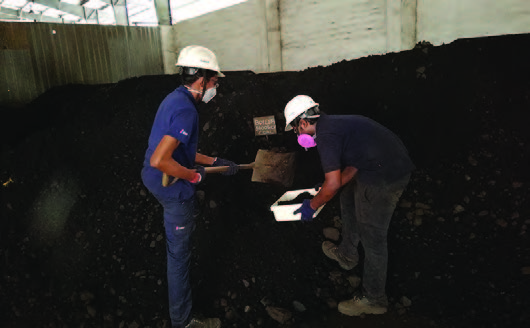
By integrating new technologies and accompanying coal with biomass, GSH Group enhanced efficiency and reduced environmental impacts in India’s FMCG sector.
In 2015, GSH Group collaborated with Kaleesuwari, a leading Fast-Moving Consumer Goods (FMCG) company in India, to optimize its steam production refineries used for the oil extraction process of raw resources.
The Palani and Chennai sites in Tamil Nadu faced operational challenges, due to poorly maintained boilers and an inexperienced, in-house team. To address these issues, the GSH team and Kaleesuwari focused on four key objectives:
1. Consistent Steam Temperature
2. Consistent Steam Pressure
3. Cost-Reduction Measures for Boiler Operations
4. Environmental Impact Reduction through Sustainable Boiler Operations
Due to the poor quality of coal being used, the GSH team initiated changes in the procurement process, sourcing higher-quality coal which immediately enhanced boiler efficiency.
The team also integrated new sensors and energy-related software to continually monitor and optimize boiler performance. Moreover, to ensure the delivery of high-quality steam, they undertook the water treatment aspect of the manufacturing site.
Having achieved the first two objectives, the team shifted its focus to the last two: cost reduction and environmental impact.

Starting in November 2017, GSH engineers introduced locally-sourced biomass products such as sawdust, wood charcoal powder, and turmeric as supplementary fuel to coal for the fluidized-bed combustion boilers.
The results were remarkable – the plant achieved an impressive 60% reduction in CO2 emissions and a significant 15% reduction in steam production costs!
But, how?
1. Enhanced Combustibility: Biomass, compared to coal, has higher volatility, making it easily combustible and requiring less external air for burning. With lower ash content and higher oxygen and hydrogen levels, biomass also presents fewer storage and combustion risks.
2. Local Sourcing: By procuring biomass locally, the project not only benefits local communities, but also eliminates the reliance on long-distance coal transportation – reducing associated costs and carbon emissions.
Locals were incentivized to contribute their waste materials, both strengthening the local economy while minimizing the area’s waste. Due to the site’s increased demand, a supplier even started a business nearby, creating over 20 local jobs and enabling individuals and small businesses to benefit from the project.
Impressed by the success and positive impacts of the project, the Institute of Workplace and Facilities Management (IWFM) hand-picked and nominated GSH Group as its representative for Global FM’s prestigious yearly industry awards.
As a testament to GSH Group’s sustainable solutions and efficient facility management practices, the company received the Global FM Gold Award of Excellence in FM 2020.
To gain deeper insights into this transformative project and its implementation process, click here to read more.
Written by David Joo, Marketing Coordinator
